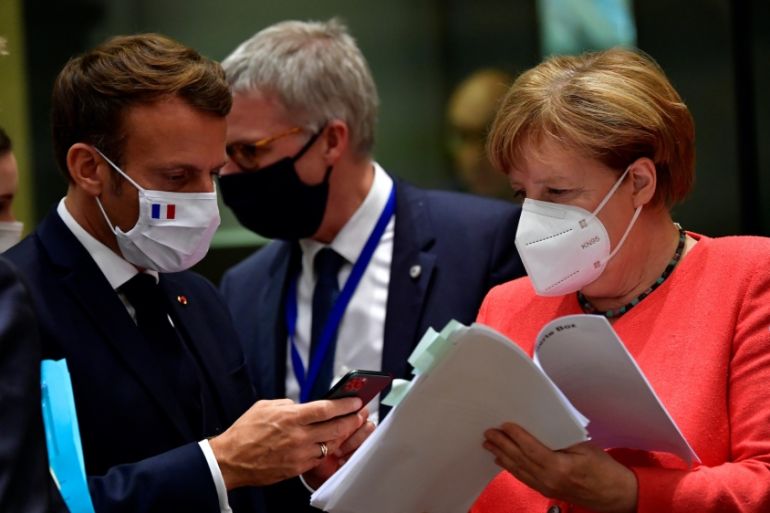EU leaders agree on $860bn joint-debt economic relief package
Deal follows days of rancour over the proportion of grants compared to loans repayable by the fund’s beneficiaries.

European Union leaders reached a deal on a massive stimulus plan for their coronavirus-blighted economies at a pre-dawn meeting on Tuesday after a fractious summit that went through the night and into its fifth day.
The deal will see the EU issue 750 billion euros ($860bn) of joint debt to help member states mitigate the economic downturn.
Keep reading
list of 4 itemsMexico’s teachers seek relief from pandemic-era spike in school robberies
‘A bad chapter’: Tracing the origins of Ecuador’s rise in gang violence
Why is the US economy so resilient?
The agreement required the unanimous approval of all 27 member states and represents a victory for German Chancellor Angela Merkel and French President Emmanuel Macron, who drafted an early outline for the proposal in May. The emergency fund will give out 390 billion euros ($446bn) of grants and 360 billion euros ($412bn) of low-interest loans.
Summit chairman Charles Michel tweeted “Deal” shortly after the bloc’s leaders reached agreement at a 5:15am (03:15 GMT) plenary session. Another official present at the summit said: “Conclusions adopted!”.
Italy, the original European epicentre of the pandemic, will likely be the biggest beneficiary from the plan. Italian Prime Minister Giuseppe Conte said his country expects to receive 28 percent of the 750 billion euro emergency fund ($860bn), comprising 81 billion euros ($93bn) in grants and 127 billion euros ($146bn) in loans.
French Finance Minister Bruno Le Maire said France would get 40 billion euros ($46bn) in subsidies as part of the EU package
Officials said the deal, which came after Michel presented compromises on the recovery fund, is critical to dispel doubts about the bloc’s very future.
The EU was slow to coordinate its initial response to the COVID-19 pandemic and, already weakened by the United Kingdom’s departure from the bloc, a united front on economic aid was important in demonstrating that it can jointly step up to a crisis.
“It has been a long summit and a challenging summit, but the prize is worth negotiating for,” Irish Prime Minister Micheal Martin said as the Brussels summit approached the record length set at a 2000 meeting in the French city of Nice of almost five full days.
European nations have done a better job of containing the coronavirus than the United States after a devastating early few months that hit Italy and Spain particularly hard, collaborating on medical, travel and economic fronts.
The European Central Bank has pumped unparalleled amounts of money into economies to keep them going, while capitals hammer out their recovery funds.
Diplomats said the leaders appeared to put aside the rancour that stood in the way of a compromise after hours of haggling through the weekend.
‘Stingy and egotistical’
Emotions ran high at a dinner on Sunday as a group of fiscally frugal northern nations led by the Netherlands stood their ground on the proportion of grants – as opposed to repayable loans – within the proposed 750 billion euros ($860bn) special recovery fund.
Macron lost patience in the early hours of Monday, banging his fist on the table in frustration at “sterile blockages” by the “frugals”, two diplomats told the Reuters news agency.
Polish Prime Minister Mateusz Morawiecki also railed against the “frugals”, branding them “a group of stingy, egotistic states” that looked at things through the prism of their own interests.
Poland would be another top beneficiary of the recovery package, receiving tens of billions of euros in grants and cheap loans, along with high-debt Mediterranean-rim countries like Italy that have taken the brunt of the pandemic in Europe.
But the rhetorical skirmishing faded on Monday, and the leaders homed in on an agreement on the stimulus package and, linked to it, the EU’s 2021-2027 common budget of approximately 1.1 trillion euros ($1.3 trillion).
While the funds will help to shore up some of the region’s battered economies, some analysts said it may not be enough.
“Is this the most effective recovery fund and budget possible? No, it isn’t. In terms of size, the fund is still relatively small given the severity of the economic crisis,” Bert Colijn and Carsten Brzeski, eurozone economists at Dutch bank ING, said in a research note sent to Al Jazeera.
“Still, given that more than a year ago a meagre eurozone budget was almost impossible and given how far apart member states had been at the start of the discussion, this morning’s outcome is still remarkable,” they added.
Hopes for a deal to help address Europe’s deepest recession since World War II sent Asian shares to a five-month high, while the main stock indices in Paris, Frankfurt, Madrid and Rome were between one percent and 1.5 percent higher in early European trade.
Italy’s borrowing costs fell to their lowest since early March and pushed the euro to a 19-week high against the US dollar.
The agreement to disburse 390 billion euros ($446bn) in grants was a far lower figure than the 500 billion ($572bn) euros originally proposed by Michel.
The Netherlands had pushed for a veto on aid for countries that backslide on economic reform, but diplomats said it was now willing to back a “stop-the-clock” mechanism by which member states could put a brake on disbursements for three months and have them reviewed.
Disbursements will also be linked to governments observing the rule of law. Hungary, backed by eurosceptic ally Poland, had threatened to veto the package if funds were made conditional on upholding democracy, but diplomats said a way forward on that was found.
|
|